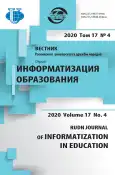Методика обучения студентов обратным и некорректным задачам в условиях информатизации образования
- Авторы: Корнилов В.С.1
-
Учреждения:
- Московский городской педагогический университет
- Выпуск: Том 17, № 4 (2020)
- Страницы: 315-322
- Раздел: ИННОВАЦИОННЫЕ ПЕДАГОГИЧЕСКИЕ ТЕХНОЛОГИИ В ОБРАЗОВАНИИ
- URL: https://journal-vniispk.ru/2312-8631/article/view/321257
- DOI: https://doi.org/10.22363/2312-8631-2020-17-4-315-322
- ID: 321257
Цитировать
Полный текст
Аннотация
Проблема и цель. Компьютерные технологии сегодня широко используются в прикладных исследованиях, направленных на получение новых научных знаний. В них применяется метод компьютерного моделирования и вычислительного эксперимента, с помощью которого возможно изучить свойства труднодоступных или недоступных человеку объектов, процессов и явлений различной природы. Это имеет непосредственное отношение к обучению студентов прикладной математике в целом и к обучению студентов физико-математических направлений подготовки обратным и некорректным задачам, которые являются научным направлением прикладной математики, в частности. Очевидно, что в процессе обучения студентов обратным и некорректным задачам целесообразно привлекать компьютерные технологии. Вместе с тем их использование должно быть уместным и корректным. Методология. Процесс поиска решения обратных и некорректных задач, как правило, трудоемок, так как такие математические задачи по своим постановкам являются нелинейными и могут иметь неединственное и неустойчивое решение. Эти обстоятельства создают математические трудности в доказательстве теорем существования, единственности и устойчивости решений обратных и некорректных задач. Компьютерные технологии помогают преодолеть математические трудности, связанные с рутинными преобразованиями и анализом информации о решении подобных задач. Результаты. Применяя компьютерные технологии, студенты приобретают опыт мобильного исследования разнообразных обратных и некорректных задач, выявления возможностей компьютерных технологий при решении различных прикладных математических задач, развивают ИКТ-компетентность. Заключение. При использовании мультимедийных и компьютерных технологий в процессе преподавания студентам обратных и некорректных задач реализуются дидактические принципы обучения, которые позволяют учащимся приобрести глубокие научные знания по обратным и некорректным задачам, развить свою информационную культуру.
Об авторах
Виктор Семенович Корнилов
Московский городской педагогический университет
Автор, ответственный за переписку.
Email: vs_kornilov@mail.ru
доктор педагогических наук, кандидат физико-математических наук, профессор, профессор департамента информатизации образования
Российская Федерация, 127521, Москва, ул. Шереметьевская, 29Список литературы
- Belov YuA, Lyubanova ASh, Polynceva SV, Sorokin RV, Frolenkov IV. Obratnye zadachi matematicheskoj fiziki [Inverse problems of mathematical physics]. Krasnoyarsk: SFU Publ.; 2008.
- Vabishevich PN. Vychislitel'nye metody matematicheskoj fiziki. Obratnye zadachi i zadachi upravleniya [Computational methods of mathematical physics. Inverse problems and management problems]. Moscow: Vuzovskaya kniga Publ.; 2019.
- Vatulyan AO, Belyak OA, Suhov DYu, Yavruyan OV. Obratnye i nekorrektnye zadachi [Inverse and ill-posed problems]. Rostov-on-Don: Izd-vo Yuzhnogo federal'nogo universiteta Publ.; 2011.
- Kornilov VS. The inverse problems in the content of training applied mathematics. Bulletin of Peoples’ Friendship University of Russia. Series: Informatization in Education]. 2014;(2):109–118.
- Kornilov VS. Training students to inverse problems for differential equations as the factor of forming competence in the field of applied mathematics. Bulletin of Peoples’ Friendship University of Russia. Series: Informatization of Education. 2015;(1):63–72.
- Kornilov VS. Realizaciya nauchno-obrazovatel'nogo potenciala obucheniya studentov vuzov obratnym zadacham dlya differencial'nyh uravnenij [Realization of scientific and educational potential of teaching university students inverse problems for differential equations]. Kazanskij pedagogicheskij zhurnal [Kazan pedagogical journal]. 2016; (6):55–59.
- Kornilov VS. Teoriya i metodika obucheniya obratnym zadacham dlya differencial'nyh uravnenij [Theory and method of teaching inverse problems for differential equations]. Moscow: OntoPrint; 2017.
- Petrov YuP, Sizikov VS. Korrektnye, nekorrektnye i promezhutochnye zadachi s prilozheniyami [Correct, incorrect and intermediate tasks with applications]. Saint Petersburg: Politekhnika Publ.; 2003.
- Romanov VG. Ustojchivost' v obratnyh zadachah [Stability in inverse problems]. Moscow: Nauchnyj mir Publ.; 2005.
- Grinshkun VV. Sushchestvuyushchie podhody k ispol'zovaniyu sredstv informatizacii pri obuchenii estestvennonauchnym disciplinam. Vestnik Moskovskogo gorodskogo pedagogicheskogo universiteta. Seriya: Informatika i informatizacija obrazovanija [Bulletin of the Moscow City Pedagogical University. Series: Informatics and Informatization of Education]. 2014;4 30):8–13.
- Boronenko TA, Fedotova VS. Formirovanie IKT-kompetentnosti nauchno-pedagogicheskih kadrov v trekhurovnevoj sisteme vysshego obrazovaniya [Formation of ICT competence of scientific and pedagogical personnel in the three-level system of higher education]. Obrazovanie i nauka [Education and science]. 2016;(1): 95–106.
- Buzhinskaya NV. Metodika ocenki urovnya IKT-kompetentnosti studentov pedagogicheskih vuzov [Methodology for assessing the level of ICT competence of students of pedagogical universities]. Vestnik Bryanskogo gosudarstvennogo universiteta [Bulletin of the Bryansk State University]. 2016;1(27):319–324.
- Goloskokov DP. Uravneniya matematicheskoj fiziki. Reshenie zadach v sisteme Maple [Equations of mathematical physics. Solving problems in the Maple system]. Saint Petersburg: Piter Publ.; 2004.
- Kornilov VS. Psychological aspects of training higher school students to fractal sets. Bulletin of Peoples’ Friendship University of Russia. Series: Informatization of Education. 2011;(4):79–82.
- Edvards ChG., Penni DE. Differencial'nye uravneniya i kraevye zadachi: modelirovanie i vychislenie s pomoshch'yu Mathematica, Maple i Matlab [Differential equations and boundary value problems: modeling and computation using Mathematica, Maple and Matlab]. Moscow: Vil'yams Publ.; 2008.
- Ivashchenko AV, Gagarin AV, Stepanov SA. Cennostnyj podhod k formirovaniyu professional'no-ekologicheskoj kul'tury budushchego specialista [Value approach to the formation of professional and environmental culture of the future specialist]. Vestnik Moskovskogo gosudarstvennogo gumanitarnogo universiteta imeni M.A. Sholohova [Bulletin of the Moscow State University for the Humanities named after M.A. Sholokhov]. 2012;1(1):58–67.
- Muravyova EV. Ekologicheskoe obrazovanie studentov tekhnicheskogo vuza kak bazovaya sostavlyayushchaya strategii preodoleniya ekologicheskogo krizisa [Ecological education of technical university students as a basic component of the strategy for overcoming the ecological crisis] (dissertation of the doctor of pedagogical sciences). Kazan; 2008.
- Fajrushina SM. Formirovanie ekologicheskoj kul'tury studentov pedagogicheskih vuzov v processe izucheniya estestvennonauchnyh discipline [Formation of ecological culture of students of pedagogical universities in the process of studying natural science disciplines] (dissertation of the candidate of pedagogical sciences). Kazan; 2007.
Дополнительные файлы









